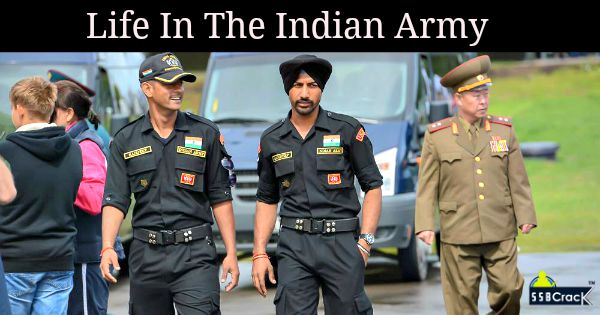The lowdown: An Army officer leads a platoon, company, division, brigade, corps, command or battalion in the Indian Army, depending on his/her rank. It is an extremely responsible and challenging job to lead a dedicated team of young men and women in critical times of war or natural calamities and also in high-risk border areas. The job requires an officer to be strong – mentally and physically – while doing his or her job and handle a crisis calmly.
Clock Work
6am: PT (physical training) with the men
8am: Breakfast in mess
9am: Train and supervise the training of soldiers
12pm: Inspect security in and around the unit, check out if plans for the Army exercise are in order and if something else is needed
1pm: Lunch
2pm: Rest or read a book
After the training is over, the jawans clean their weapons, deposit at the Kote (Armoury) and then are told the ‘orders’ of the day (i.e. activities till night and the next day). Then they have lunch and rest.
1600h is Games for all (and not squash for officers). Till 1800h.
1900h, the night guards and picquets are out.
1930h Officers Dress call. (Dressing for dinner)
In the olden days there was Dinner Night for all days (except Saturday). On Saturday and Sunday, it was Supper Night.
Dinner Night was that dressed formally for Dinner and on Supper Nights you were informal (which means no need for ties). Dinner Nights meant that all had to eat together with the Senior Dining Member being the President.
Saturday and Sunday was for private parties or the Club.
Officers also trained with the troops. The Company Commander supervised the training as per the Training Programme with the CO/ Training Officer doing the rounds.
After training till lunch, was the Orderly Room (meeting people who had issues to discuss or disciplinary cases being marched in) and Administration.
On Saturday, instead of training, you had the make and mend parade after the Arms cleaning.
The payoff
After the Sixth Pay Commission, a newly commissioned lieutenant gets around R65,000 a month. A lieutenant colonel/colonel gets around R1,00,000 a month and lieutenant general makes more than R2 lakh a month. More than the money, this job is attractive for its perks – pension after retirement, subsidised accommodation, free rations, free medical treatment, insurance through the Army Group Insurance Fund etc
Skills/TRAITS
You need to possess officer-like qualities (popularly known as OLQs) in order to become an officer. These qualities are: effective intelligence, reasoning ability, organising ability, power of expression, social adaptability, cooperation, sense of responsibility, initiative, speed of decision, group influencing ability, self-confidence, liveliness, determination, courage and stamina. Learn some tips and tricks to ace the SSB interview the https://ssbcrack.com/ssb-interview/ssb-interview-tips
Getting there
You can either write the National Defence Academy exam (if you have passed Class 12) for entry to NDA, Pune, or the Combined Defence Services exam (if you are a graduate) for entry to OTA (Officers’ Training Academy), Chennai, or IMA (Indian Military Academy), Dehradun. OTA is for officers who want to join the short-service commission, while candidates wanting permanent commission should apply for NDA or IMA.
There is a technical entry also, where budding and current engineers can apply. Technical entry is open for engineering graduates/engineering students (final year or pre-final year)/Class 12 passed students (with physics-chemistry-maths). For all these entries, check out newspaper advertisements in March/April and October/November. After the written exam, you have to appear for the Service Selection Board (SSB) interview, which lasts for five days and tests your leadership qualities
Institutes
Depending on the entrance test you have cracked, you are sent to one of these academies:
. National Defence Academy
. Indian Military Academy
. Officers Training Academy
Pros and cons
. Highly respected profession where you learn to live with a high degree of discipline and ethics
. Very secure job like any other government service
. Family life may suffer as you have to move often, and at some stations, your family cannot accompany you
. Is a very challenging profession.







